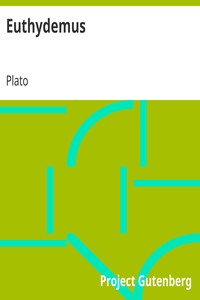Euthydemus by Plato
"Euthydemus" by Plato is a philosophical dialogue written in the late 4th century BC. This work explores themes of knowledge, virtue, and the art of sophistry through a series of humorous and satirical exchanges between Socrates and the sophists Euthydemus and Dionysodorus. The dialogue showcases how the sophists employ clever, but often nonsensical, verbal tricks to confuse and mislead their audience. The opening portion of "Euthydemus" introduces Socrates as he recounts an
encounter with the brothers Euthydemus and Dionysodorus, who have gained a reputation for their rhetorical skills and dubious philosophies. Socrates expresses interest in their purported ability to teach virtue, especially as it relates to his young friend Cleinias. As the dialogue unfolds, Euthydemus and Dionysodorus engage in a series of perplexing arguments that challenge Cleinias' understanding of knowledge and learning. Their playful and paradoxical questioning not only highlights the absurdity of their claims but also serves as a critique of sophistry itself, as Socrates attempts to navigate their convoluted reasoning while seeking a genuine understanding of virtue and wisdom. (This is an automatically generated summary.)
Read or download for free
| How to read | Url | Size | |||
|---|---|---|---|---|---|
| Read now! | https://www.gutenberg.org/ebooks/1598.html.images | 160 kB | |||
| EPUB3 (E-readers incl. Send-to-Kindle) | https://www.gutenberg.org/ebooks/1598.epub3.images | 110 kB | |||
| EPUB (older E-readers) | https://www.gutenberg.org/ebooks/1598.epub.images | 110 kB | |||
| Kindle | https://www.gutenberg.org/ebooks/1598.kf8.images | 189 kB | |||
| older Kindles | https://www.gutenberg.org/ebooks/1598.kindle.images | 179 kB | |||
| Plain Text UTF-8 | https://www.gutenberg.org/ebooks/1598.txt.utf-8 | 134 kB | |||
| Download HTML (zip) | https://www.gutenberg.org/cache/epub/1598/pg1598-h.zip | 108 kB | |||
| There may be more files related to this item. | |||||
Similar Books
About this eBook
| Author | Plato, 428? BCE-348? BCE |
|---|---|
| Translator | Jowett, Benjamin, 1817-1893 |
| Title | Euthydemus |
| Note | Wikipedia page about this book: https://en.wikipedia.org/wiki/Euthydemus_(dialogue) |
| Note | Reading ease score: 75.6 (7th grade). Fairly easy to read. |
| Credits | Produced by Sue Asscher, and David Widger |
| Language | English |
| LoC Class | B: Philosophy, Psychology, Religion |
| LoC Class | PA: Language and Literatures: Classical Languages and Literature |
| Subject | Classical literature |
| Subject | Logic -- Early works to 1800 |
| Subject | Socrates, 470 BC-399 BC |
| Subject | Philosophy, Ancient |
| Subject | Sophists (Greek philosophy) |
| Category | Text |
| EBook-No. | 1598 |
| Release Date | Jan 1, 1999 |
| Most Recently Updated | Jan 16, 2013 |
| Copyright Status | Public domain in the USA. |
| Downloads | 630 downloads in the last 30 days. |
| Project Gutenberg eBooks are always free! | |


